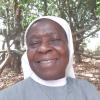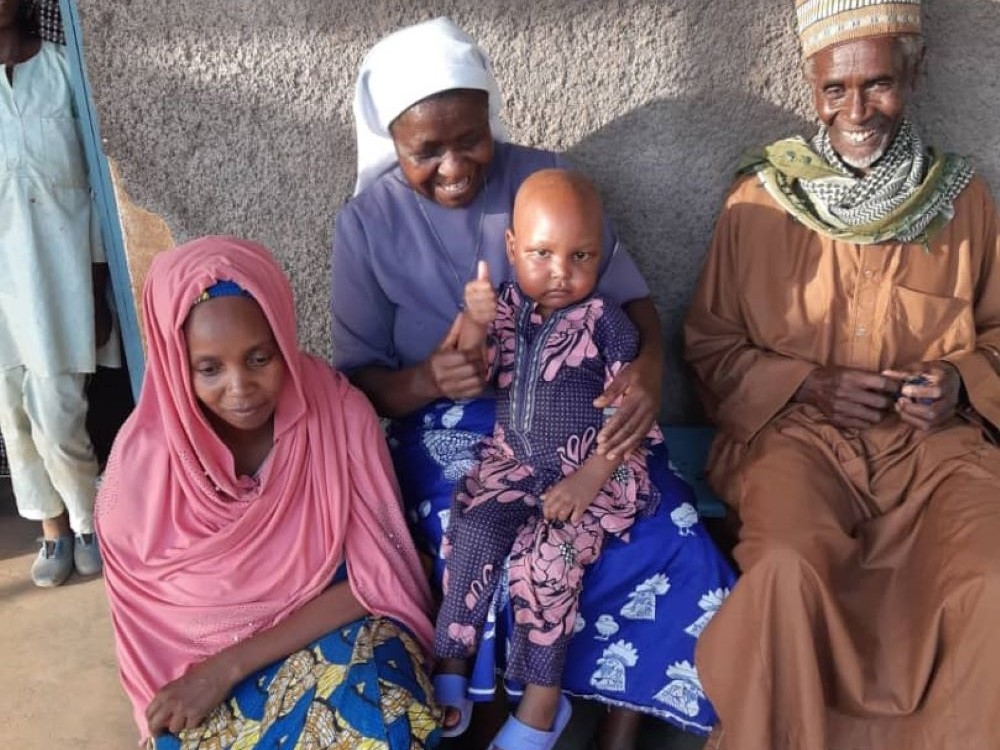
Mohan's parents brought him to the health center where Sr. Felicitas Asoh works in January after consulting with traditional healers. He was discharged and ready to return home with his parents on Feb. 24, after recovering from malnutrition. (Courtesy of Felicitas Asoh)
I have been working with malnourished children and underprivileged people throughout my 50 years as a woman religious and nurse. From my novitiate days, it was my routine to go into the community for home visits. These visits fostered in my heart a passionate sensitivity for children who needed better diets, particularly those suffering from kwashiorkor or marasmus.
Over these years, I have experimented and discovered that local foods, when combined correctly, can work against malnutrition. So, wherever I have worked, I looked for natural grains and other foods produced in that area that would bring children back to health. Nature is there to help us if we only look to see it.
My staff and I run a health center at Mayo Darle, a village in the Mayo-Banyo Division in the Adamawa Region of Cameroon. Unfortunately, we find many malnourished children in our outreach program. We bring these children back to health using loving care and our special nutrition recipe that includes soybeans, corn, groundnuts, rice, eggs, vegetables and crayfish. We grind and mix these into a meal, which can be fed wet or dry to the suffering children. Our challenge is always to find enough of these ingredients because the demand is so high. So many children are becoming malnourished as the war here in Cameroon continues, leading to displacement and instability.
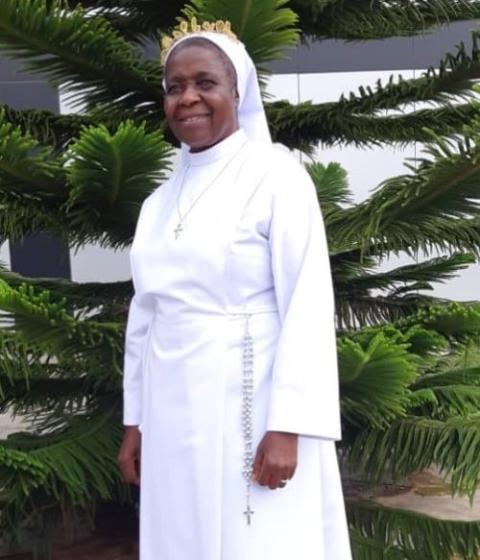
Sr. Felicitas Asoh celebrates her 50th anniversary as a woman religious and nurse in Shisong, Cameroon. (Courtesy of Felicitas Asoh)
Our team supports 17-20 malnourished children each year, and recently three, who were orphaned are being cared for by foster mothers. The women come to the health center for training in child care and are learning to prepare the nutritive pap from the local grains and nuts they can buy at the markets.
One child who dramatically benefited from our holistic methods and local foods was 5-year-old Mohan, brought by his parents to the health center in January. His parents had escaped conflict related to the so-called Anglophone crisis. They are part of a discriminated group called "black legs" by the non-state armed militia because they have copper-colored skin, straight hair and noses and thin lips, part of the Niger-Congo family. Fleeing for their lives, the family lost their home and all possessions, including cows, their primary livelihood. Having nothing to live on, they had no way to feed Mohan, their seventh child, who fell into kwashiorkor while the mother was expecting her eighth child. Mohan was unconscious, terribly malnourished, convulsing and paralyzed on the right side of his body.
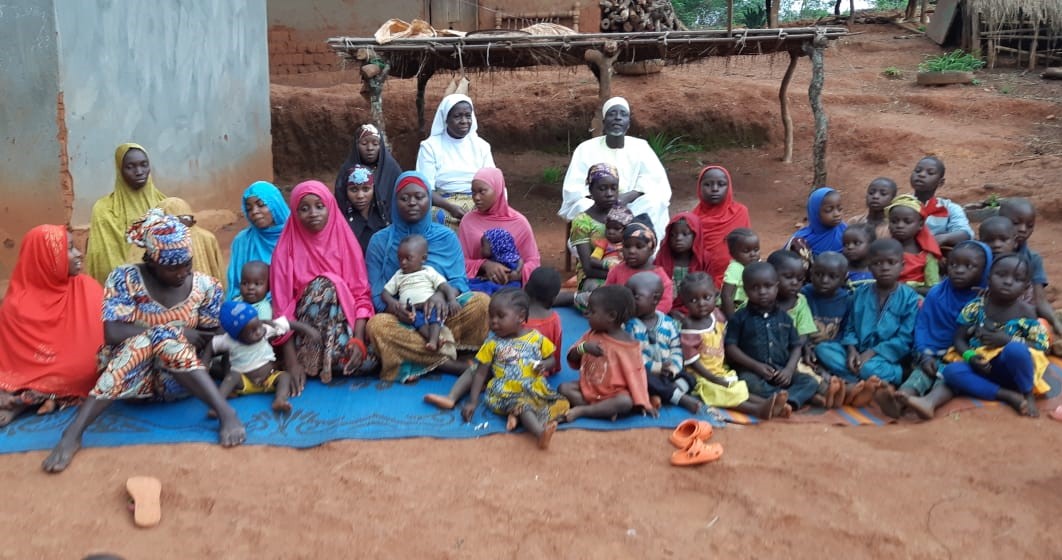
Sr. Felicitas Asoh conducts community health visits in the Mayo-Banyo Division of Cameroon to identify malnourished children. She said many children experience malnutrition as the war in Cameroon continues, leading to displacement and instability. (Courtesy of Felicitas Asoh)
My staff and I first discovered him while on a community outreach visit to their village in the Mayo-Banyo Division in the Adamawa Region. We were very concerned about his condition and referred him to our clinic. However, the family decided to consult with traditional healers first. Traditional healers, although they trust the sisters' hospital (Western medicines) for illnesses like malaria, believe malnourished children suffer from witchcraft, which only they can cure. They fear injections will make the illness worsen. Their cure is to give prepared combinations of various powdered herbs mixed with liquids to their patients. They also instruct families regarding eating and lifestyle believed to enhance their health. For a malnourished child with swollen limbs and face, their instruction would advise pure corn flour pap and prohibit meat, fish, eggs and groundnuts.
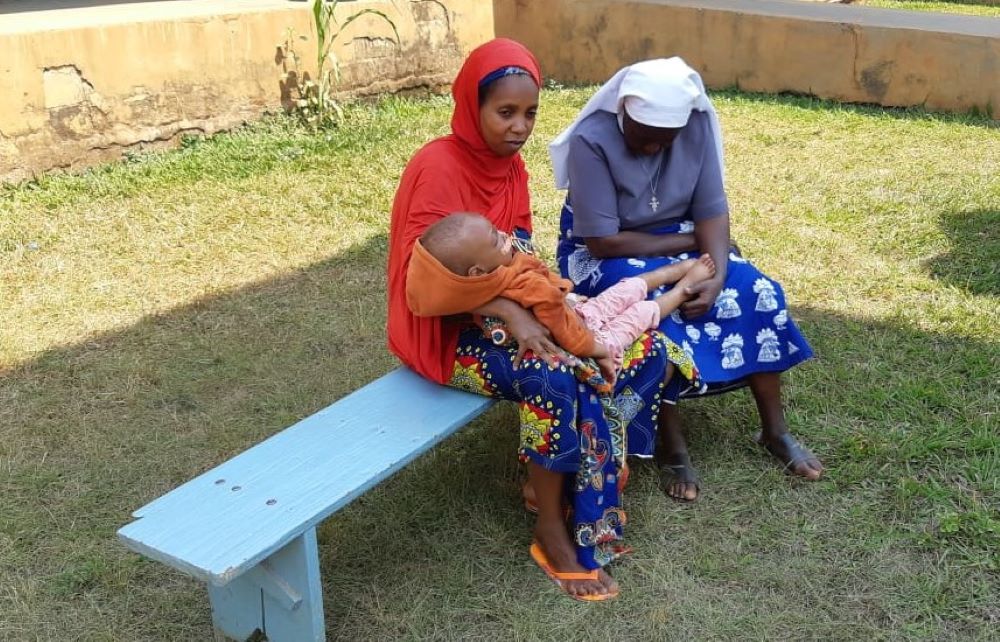
Sr. Felicitas Asoh prays with and counsels a woman and her son, Mohan, who was treated for malnutrition at the health center in Mayo Darle, Cameroon. (Courtesy of Felicitas Asoh)
The family had followed these cures, going from one healer to another. But finally, after a year, they brought Mohan to us, coached by a woman in the village whose child we treated for kwashiorkor in the past. Mohan's condition had deteriorated dramatically since we had first seen him. We hurriedly gave him medicines and placed him on nasogastric feeding every three hours using our local food remedy.
Mohan's response to our holistic treatment was disappointingly slow, and we almost lost hope that he would survive. I continued to encourage the staff not to give up. Thankfully, with our concerted efforts and prayers, he recovered and was discharged on Feb. 29.
Discharge at this time of year is risky because it is the beginning of what is known as the Cameroon "hunger" season. This was a worry to us, fearful that Mohan would relapse, so to prevent this, we prepared food for the parents to take with them and taught his mother how to make the pap (named LASO 50). We also encouraged her to use the same food to feed several family elders and convalescent family members we had noticed living nearby.
Nature is there to help us if we only look to see it.
Because this natural food has been so successful in our efforts against malnutrition, but at times products are difficult to find, I even took up farming to add to the purchased produce needed for the healing food. My two nieces provided me with a grinding machine that is invaluable for the entire community, which we keep available for them, as most families are not able to afford their own. Outside organizations have also helped us. The nonprofit Ashia Cameroon has supported us for many years, and Dr. Daniel Gwan-Nulla, a Cameroonian-born American and director of thoracic surgery and thoracic oncology at Piedmont Columbus Regional in Georgia, U.S., also partners with us.
Advertisement
Many colleagues in villages in regions where I have worked, including my Tertiary Sisters of St. Francis, are joining me to reduce malnutrition among children and the elderly wherever they serve. As malnutrition continues to increase because of the continuing war and instability, the need for more grinding, drying and crushing machines also increases. We always struggle with finances.
Although caring for malnourished children may have begun as a responsibility and urgent necessity, it is now the love of my life. That love has deepened even in the midst of many setbacks, such as impatient parents who want to hurry home and cultivate their farms or take care of other children, the overall poverty of the people, the hard-to-change unhealthy beliefs in traditional healers and sometimes, impatient team members. My sleep is often disturbed when children are brought in, but I do not mind going to the health center to ensure that the children are fed properly. It is rewarding to know how many lives have been saved by these efforts. God has blessed me so abundantly.
